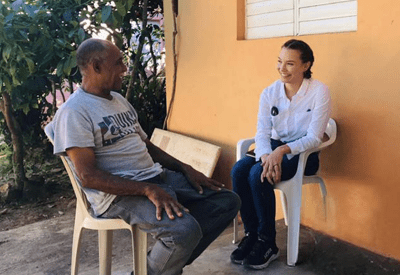
In the heart of the Caribbean, amidst the vibrant culture and lush landscapes of the Dominican Republic, Lucia Vitale found that engaging in cultural exchange and international research would lead to a life-changing journey as a Fulbrighter.
Vitale’s Fulbright story began during her fourth-year PhD dissertation project, centered around healthcare access. Specifically, this included understanding how different groups access health care in the rural Dominican-Haitian border area and what this means for larger concepts of citizenship in an increasingly mobile world. Her time spent working in this region proved pivotal in directing her scholarship.
“Since the first day of graduate school, I knew that fieldwork was going to be a significant component of my PhD journey, and to my identity as a scholar,” said Vitale.
After PhD candidacy exams, armed with a passion for global health and social justice, Vitale embarked on a mission to find a funding opportunity that would provide the ability to live and conduct fieldwork in her research sites, the Dominican Republic and Haiti.
The scope of Vitale’s research included collecting data on healthcare access in the form of an original 34-question survey, focus groups, and interviews with aid agency personnel, NGO workers, government bureaucrats, and politicians.
During the search for funding, she learned about and became interested in the Fulbright U.S. Student program.
“The Fulbright U.S. Student program seemed like a beautiful opportunity to return to a place that I loved, the Dominican Republic, to continue with my PhD program, and to immerse myself in truly in-depth fieldwork,” Vitale said. “I saw this as an opportunity to deepen connections, uncover new perspectives, and engage in meaningful research.”
One of the unique aspects of a Fulbright program is the opportunity it gives students to encounter new ways of thinking and understanding diverse views on social and academic landscapes, providing a rich environment for well-rounded research and development. What distinguishes Fulbright from other programs is that reciprocal relationship-building is the principal avenue through which cultural understanding takes place.
“Through building relationships, I have seen first-hand how the consequences that individuals face in contexts where there are no social safety nets can look different from certain U.S. circumstances,” said Vitale. “Engaging with other places and understanding societal factors and motivators introduces you to systems that look very different from our own, and sometimes even look similar.”
Another feature of Fulbright that sets it apart from other funding opportunities is the use of affiliation organizations that provide support to Fulbrighters during their program. Vitale was fortunate to work with OBMICA, a research center based in Santo Domingo that advocates for the human rights of migrants and their families.
“OBMICA has strong ties to immigrant communities, indeed much of its staff comes from migrant backgrounds, and is thus trusted to advocate for migrant rights,” said Vitale. “To get to be up close and personal with an organization that was doing such fantastic work was an honor. Building a relationship with my affiliation organization was easily one of the best parts of the Fulbright program.”
One key to long-term success during an on-site, self-guided immersion program like Fulbright is access to support systems that can provide guidance and assistance when research plans are interrupted. While Vitale had a rather precise understanding of her research strategy, her affiliation organization (OBMICA) became essential to connecting her with the right people and helping solve problems when unforeseen issues arose. Not only did OBMICA provide on-site support, but they are also involved in the Fulbright application process.
“There were many hurdles to overcome while on the Fulbright program, and the support of my affiliation organization, as well as others in my Fulbright cohort, taught me a lot about adaptation, shifting plans, and reworking plans,” said Vitale. “Due to their interest in my project, they were happy to be involved in workshopping ideas and solutions. That was very motivating.”
Reflecting on the Fulbright experience, Vitale believes that it helps to let go of some expectations or ideas about what a program should look like, making room for shifts and changes in plans.
“It is so important to embrace what’s often an unknown experience. The beauty of a Fulbright experience is that it is open, it changes, and you can make of it what you want,” said Vitale. “While that requires intention and value-alignment, it is a wonderful, unique experience that propels scholarship.”
Since participating in the Fulbright Program, Lucia Vitale has served as an instructor of record for Global Community Health 165, part of Global and Community Health at UC Santa Cruz, an interdisciplinary endeavor with B.A. and B.S. majors.
“The Fulbright experience has not only influenced my research, but it has also shaped how I show up in the classroom as an instructor and teacher, Vitale said.”
The Division of Global Engagement administers the application process for Fulbright at UC Santa Cruz. Students interested in applying to the Fulbright U.S. Student Program should make an advising appointment with Gabi Schmiegel, the Assistant Director for Sponsored Student Programs.
Learn more on the Postgraduate Scholarships section of the Global Learning website.
